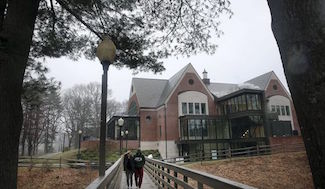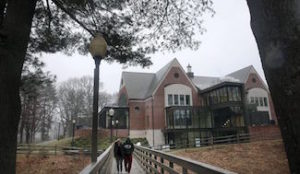Rising expenses and fixed endowments force institutions to make tough choice
 Small private colleges across the country are increasingly finding themselves trapped between ever-rising expenses and unchanging endowments, forcing administrators into hard decisions such as canceling courses, merging with other colleges and even closing schools.
Small private colleges across the country are increasingly finding themselves trapped between ever-rising expenses and unchanging endowments, forcing administrators into hard decisions such as canceling courses, merging with other colleges and even closing schools.
“The college meltdown across America has been occurring for at least eight years, and there are few signs that it will slow down in 2019,” said Dahn Shaulis, whose College Meltdown blog monitors concerns in higher education.
Small colleges can offer students intimate education settings, smaller student-to-teacher ratios and specialized courses not found at larger schools. But their financial constraints can affect enrollment, course offerings and class sizes; discourage faculty hiring; limit research projects; and impact accreditation and other ratings. Closures can reduce options for college-bound students.
Last summer, the credit rating agency Moody’s found that one-fifth of small private colleges nationwide were under “fundamental financial stress” that could lead to closure, merger or program cuts. The latter option was chosen by Baltimore’s Goucher College, which has an enrollment of 1,450 undergraduates and a $200 million endowment. The liberal arts college announced last summer that it will end several majors and minors — including physics, math and music — to save money.
The president of Hampshire College in Amherst, Massachusetts, announced last week that the liberal arts school’s survival likely depends on a merger with another institution. Hampshire already shares resources with its fellow members of the state’s Five College Consortium, which also consists of Amherst College, Mount Holyoke College, Smith College and the University of Massachusetts at Amherst.
With an enrollment of 1,400 students and a $56 million endowment, Hampshire is undecided about whether to admit a freshman class next fall.
Moody’s last summer found that private colleges were shutting down at a rate of roughly 11 per year and predicted a higher closure rate in the future.
According to the U.S. Department of Education, 20 private, nonprofit colleges closed during the 2016–17 and 2017–18 academic years.
Competition with larger institutions has prompted many smaller colleges to offer discounted tuition to entice budget-conscious students.
Michael B. Horn, a co-author of “Disrupting Class: How Disruptive Innovation Will Change the Way the World Learns,” noted such discounts as key factors in colleges’ failing business models.
Discounts typically are delivered via financial aid packages and school grants. Discounts above 35 percent, Mr. Horn said, place colleges “in a danger zone, particularly when they are heavily dependent on tuition.”
A survey last year of the National Association of College and University Business Officers across America found that the average tuition discount rate for freshmen was 49.9 percent.
Mr. Horn, the chief strategy officer for the education technology firm Entangled Group, also noted that more students are enrolling in online courses, which incur no room-and-board costs and often are tailored to teach skills for employment. The cheaper alternative, he said, is drawing students away from bricks-and-mortar small colleges, which are scrambling to present viable online programs but aren’t finding significant success.
“Online learning is the most disruptive innovation in education since the printing press,” Mr. Horn said.
The education technologist said small colleges are in an “arms race” to attract students by increasingly adding “more faculty, more extravagant facilities and more administrative positions.” The competition increases operating costs and debts amid unchanging endowments and discounted tuition, he said.
“Essentially, the system is now destroying itself,” Mr. Horn said.
The disruption has hit education in New England particularly hard.
Read Dr. Gordon Finley’s response to this column on Metropolis Café
In Massachusetts, where small private colleges have played major roles in the local culture and economy for centuries, 17 mergers or closures have occurred in the past five years. In May, 119-year-old Mount Ida College in Newton shut down, stranding three classes of about 1,080 undergraduates. The private college gave its 74-acre campus to the University of Massachusetts at Amherst, which also absorbed the school’s roughly $60 million debt.
The closure played out so corrosively among faculty and students that officials at the Massachusetts Department of Higher Education, who knew nothing of Mount Ida’s dire financial health until the closing announcement, have spent months crafting stricter transparency measures for private colleges.
This week in Boston, state officials are reviewing plans to subject all private colleges in Massachusetts to a yearly “financial stress test” to gauge fiscal health. Any school failing to comply would lose state financial aid and possibly accreditation.
Copyright © 2019 The Washington Times, LLC.
Written by Dan Boylan for The Washington Times ~ January 23, 2019

 FAIR USE NOTICE:
FAIR USE NOTICE: